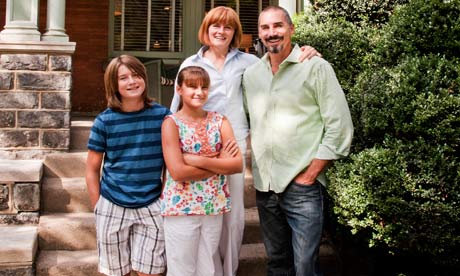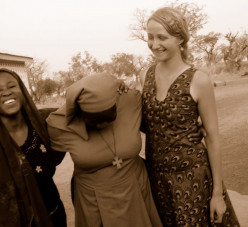How will the definition of family evolve and change in the future?

Will the definition of family include non-related people who care and respect each other? Will families remain small as the improvements in contraceptive technologies and an increase in social networks is making large families a virtual dinosaur and unnecessary? What is YOUR opinion on this?
- mbuggiehposted 12 years ago
0
Social and cultural conceptions of family have changed many times over the centuries. Our current conception, the "nuclear family" (father, mother, and 2-3 biological children) emerged in the 1950s as part of a larger Cold War era civil defense effort to maximize the number of American people who would survive an atomic (read NUCLEAR) bomb attack. Prior to that families were multi-generational groups that included not only parents and children, but what we would today call "extended" family and distant relatives.
Eh....while I see your view.......
I was a '50's baby, but preceded by 9 siblings! And many of our friends' families were that large or larger. And I'm pretty sure none of us were deliberate results of any plan to populate the world after a nuclear attack! So unless we were just uniquely fruitful, I think the cold war analogy is off a bit.........
but yeah I think gmwilliams' questions can be answered with a yes.
Sadly.
And I think he left out the holocaust of abortion that's been diminishing family trees for over 40 years......Yes, the family has undergone various evolutions and changes. It was multigeneration blood-related families, then it was strictly one generation nuclear families. In the future,the definition of family will include both blood-related and non-blood related family members. The latter applies especially as blood-related families become smaller.
As blood-related families become smaller, non-blood related families will become larger. However, there are STILL THOSE who staunchly insist that the definition of family only includes blood relatives in a nuclear family setting, sometimes not considering extended and/or distant blood-relatives as family. There is a level of clannishness and insularity existing within such people.
With the increased rise in small families, people are including friends as family. The small family has resulted in more globalization and a universalisitic attitude as far as family. The strict definition as family to mean only immediate blood-related immediate family members is becoming outcome, except among a dwindling percentage of the population. The average person has evolved beyond such narrow definitions of family.Do you feel that - It is better to have huge families (including both blood-related and non-blood related family members) than an individual nuclear family?
A resounding no. A small sized family with blood and non-blood related members is better. At least, this family unit will be more cohesive and people will ALWAYS be in contact with each other.
Right on, quality over quantity. The more the quantity, the less the quality.
Family is the close kinship---in deeply anthropological/sociological definition of the term "kinship", that we make and not that we are necessarily born into. Biology and genetics do not make a family. Kinship does.
In the future, the family is definitely going beyond blood boundaries, that's for sure. Also, the family may evolve from nuclear status to communal status. People are going to evolve beyond their particular insularity and have a more communal and global approach to the definition of family. Family is already extending beyond blood ties to include other people into the circle. Circles of friends are considered family and some are EVEN CLOSER than blood family.


For many people, FRIENDS are FAMILY.
Related Discussions
- 4
What are the 10 ways that families will evolve within the next 50-150 years? Wi
by Grace Marguerite Williams 10 years ago
What are the 10 ways that families will evolve within the next 50-150 years? Will family includenon-blood related people as well as blood related people? How will life extension up to at least 200 years and beyond impact upon families and human population? The definition of families is...
- 21
Future World
by Grace Marguerite Williams 10 years ago
Within the next 60 to 150 years, how will the family evolve and metamorph? Will the family include less people who are blood-related and more people who are non-blood related? Will the 1-child family become the norm in the future with the multichild family becoming extinct? Will...
- 5
US Presidents are descendant from the British & French Royal
by thecounterpunch 16 years ago
The books Burke's Peerage & Baronetage and Burke's Landed Gentry have, for 175 years, recorded the genealogies of the UK and Ireland's titled and landed families. Often referred to as 'the aristocracy bible', these are without comparison as a genealogical reference to the influential figures...
- 69
End Times for America?
by Ken Burgess 5 years ago
Are you aware of the hypocrisy of the past few months?We had lock-downs in states like CA and MN and MI where exercising any of your rights other than shopping for food was made practically illegal.Don't open your business, don't go to the beach, don't go to the park, its too dangerous.And now...
- 18
Has religion helped define the modern family?
by Barrington Nixon 13 years ago
Has religion helped define the modern family?
- 11
Is Blood Really Thicker than Water?
by thirdmillenium 15 years ago
Are blood relations more forgiving than others?








